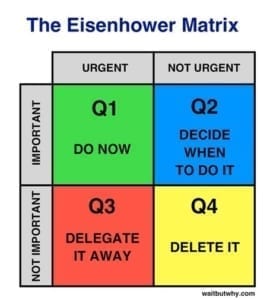
Entering the Matrix
A Michigan AP builds upon a time-tested management strategy to keep tasks on track.
Topics: Assistant Principals, School Management
Assistant principals might be forgiven for thinking of “time” and “task” as dirty words—right up there with the four-letter classics. Almost every day’s schedule is already overloaded before the inevitable nosebleed, angry parent, call from the principal, or—yes—pandemic derails the train.
Andrew Lindsay is assistant principal at Owen Intermediate School in Belleville, Michigan. He spends his days supporting the principal’s goals for instructional rigor, managing administrative tasks, and addressing behavioral issues (which diminished substantially during the pandemic).
His schedule can easily be disrupted by what he calls that “3 Bs”—Blood, Blue Uniforms, and Beloved—but he uses technology, management techniques, and old-school analog tools to get back on track.
He says task management in the current school year sorts out into five essential groups of actions:
Set Priorities
 Adopt the four-quadrant “Eisenhower matrix” popularized by Stephen Covey’s 7 Habits of Highly Effective People. Put first things first by assigning tasks to one of four quadrants:
Adopt the four-quadrant “Eisenhower matrix” popularized by Stephen Covey’s 7 Habits of Highly Effective People. Put first things first by assigning tasks to one of four quadrants:
- Urgent and important: This includes the 3 Bs, as well as deadline-driven projects, crises, and tasks from the principal.
- Not urgent and important: Tasks to plan include empowering others, relationship-building, and personal and professional learning.
- Urgent and not important: Emails, interruptions, social media, and certain meetings; these tasks may be suitable for delegation.
- Not urgent and not important. This includes busy work and certain emails and phone calls.
Move tasks around the matrix as they evolve.
Reflection question: Is my decision-making formula effective? “You either do it, delegate it, defer it, or drop it,” says Lindsay.
Delegate
- Manage urgent/important tasks yourself, but delegate others—especially the urgent/not important tasks.
- When you’re delegated to, determine into which quadrant the task fits.
- When delegating, be open to staff pushback.
- Parcel out small pieces of larger tasks.
Reflection questions: Is there method to my delegation? Whose skill sets fit the moment or task, and who can learn from the experience? When you delegate, make the work constructive.
Get Back on Track
- Calendar an “ideal” week, slotting times for broad categories of tasks such as classroom observation and lunch supervision. When you’re not on an urgent/important task, adhere to the calendar schedule. After an emergency subsides, return to the calendar.
- nclude office time in your ideal week, and use it. Sit down to do administrative tasks instead of taking them home.
- Keep your laptop and phone with you, so you can multitask while performing such duties as lunch supervision.
Reflection question: Am I letting meetings consume my time? If you’re there only to learn background information, Lindsay says, get it later via email or debriefing. Emphasize attendance where your contribution is required and the topic aligns with existing priorities.
Manage Communications
- Don’t check emails constantly. Set a time for review and respond within 24 hours.
- Avoid using your email inbox as a to-do list. Clear it out every day by answering notes that require immediate attention and snoozing the rest for later.
- Use Google Voice to establish a separate phone number for calls and texts to parents. If it’s urgent, answer right away. If not, don’t feel pressured to set aside everything else in order to respond.
- Create your own customer management system to keep track of communications and contacts. Lindsay is a tech aficionado, but he uses 3 x 5 cards, filed by student name, to track voice messages and conversations with parents.
Reflection question: Have I learned to say no? APs are people-pleasers by nature, but Lindsay notes that aligning professional priorities with personal goals, such as spending time with family, is a key factor in time management.
Adapt to Remote Learning
- Establish a hierarchy of contact to encouraging attendance. Delegate exploratory conversations with the family to the teacher, and bring in counselors if you uncover a problem. If the problem continues, APs can step in. “The teachers know which kids are phoning it in and which are working,” Lindsay says. “I want to go where I’m needed.”
- Leverage technology to keep track of virtual classes. Lindsay uses a spreadsheet listing the links for all Google classrooms, so that he and the principal, counselors, and social workers can find classes right away.
Reflection question: Am I keeping social-emotional learning at the forefront? In the remote and hybrid learning environment, Lindsay says, “We’re focusing on the big rocks—what’s important to learn. The fact that our teachers let social-emotional learning be one of those big rocks is so important. You can always learn something later, but sometimes, emotional support needs to be at the moment—it needs to be bumped to Quadrant 1.”
M. Diane McCormick is a freelance writer and Principal magazine contributor based in Harrisburg, Pennsylvania.

